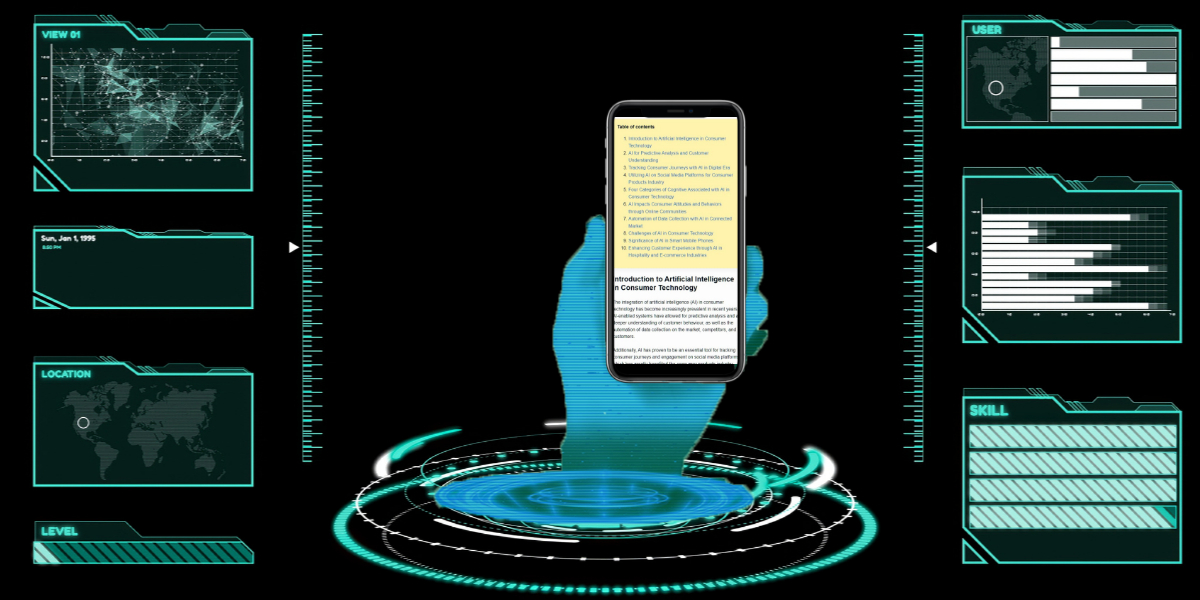Artificial intelligence, or AI, has been making waves in the world of consumer technology over the past few years. From chatbots to smart home devices, AI is becoming increasingly integrated into our daily lives.
As a result, it’s important to take a step back and examine the role of AI in consumer technology. What are its benefits? What are the potential risks? And how is it changing the way we interact with our devices and each other?
In this blog, we’ll explore these questions and more to gain a better understanding of how AI is shaping the future of consumer technology.
Table of contents
Introduction to Artificial Intelligence in Consumer Technology
The integration of artificial intelligence (AI) in consumer technology has become increasingly prevalent in recent years. AI-enabled systems have allowed for predictive analysis and a deeper understanding of customer behaviour, as well as the automation of data collection on the market, competitors, and customers.
Additionally, AI has proven to be an essential tool for tracking consumer journeys and engagement on social media platforms, which has greatly benefited the consumer products industry.
Despite its many advantages, the implementation of AI in consumer technology also presents significant challenges, such as data privacy concerns and the risk of job market polarization.
However, the positive impact of AI on consumer experience cannot be ignored, especially in the hospitality and e-commerce industries.
Overall, the use of AI in consumer technology has revolutionized the way businesses operate and interact with their customers, and its influence is only expected to grow in the coming years.
AI for Predictive Analysis and Customer Understanding
In the world of consumer technology, artificial intelligence has emerged as a powerful tool for predicting consumer behaviour and understanding customer needs. By analysing data from previous events, AI can reliably predict what customers are looking for and tailor marketing strategies accordingly.
This not only benefits businesses by boosting sales and customer retention, but it also enhances the customer experience.
AI can also help track consumer journeys in the digital era, automate data collection in connected markets, and enhance customer experience in industries such as hospitality and e-commerce.
Despite the challenges of implementing AI in consumer technology, its significance in enhancing customer understanding and satisfaction cannot be ignored.
Tracking Consumer Journeys with AI in Digital Era
AI technology allows businesses to understand customers’ behaviour patterns in real-time, generate insights, and tailor their experiences accordingly.
AI algorithms can analyze customer’s digital behavior, preferred channels, interests, and past purchases to predict their likes and dislikes, ultimately delivering a personalized experience.
With AI-powered tools, businesses can analyze data from multiple sources, filter out the noise, identify potential customers, optimize campaigns, and disseminate content more effectively. AI-driven insights enable marketers to make informed decisions and boost their revenue.
CrawlQ is a cutting-edge AI content intelligence and strategy platform that is transforming the way businesses research, plan, and craft “Brand Love” with their audience.
CrawlQ uses intelligent experience engines to assemble high-quality customer experiences by analyzing a broad range of inputs about consumers, such as public record information, criminal records, credit history, and more.
This AI model ensures that companies can deliver personalized and engaging experiences that are tailored to their customers’ needs and preferences. With CrawlQ, businesses can gain a deeper understanding of their customers and make data-driven decisions that boost customer and employee satisfaction, customer lifetime value, and overall business success.
By leveraging advanced AI concepts like machine learning, CrawlQ is an example of how AI can be used to enhance consumer journeys and provide exceptional customer experiences.
AI is revolutionizing the way businesses track and understand customer journeys, providing insights that were previously unattainable. By using AI, businesses can optimize marketing campaigns, streamline customer journeys, and enhance their overall customer experience.
Utilizing AI on Social Media Platforms for Consumer Products Industry
Utilizing AI on social media platforms for the consumer products industry is transforming how brands market their products across platforms such as Twitter, Instagram, Facebook, and more.
With AI, social media marketers can identify the right audience for a particular marketing strategy, making campaigns more effective and efficient.
The integration of AI into social media platforms allows advertisers to provide personalized recommendations, making checkout faster and more efficient.
Additionally, AI helps brands create more effective social campaigns and be more efficient with their use of time.
Predis is a cloud-based AI-SAAS platform that helps businesses create captivating video and image content for social media. Using AI technology, the platform offers multiple social media content options in just a few clicks.
Furthermore, Predis’ AI-powered content analysis provides businesses with insights into content performance and audience engagement, enabling them to refine their social media strategy. An excellent resource for businesses, entrepreneurs, and individuals looking to create engaging content, Predis is an excellent example of AI use on social media platforms.
With its free Skynet trial, anyone can experience the platform’s capabilities and see the difference it can make for their social media presence.
As consumers spend more time on social media platforms, leveraging AI to enhance the effectiveness of marketing in this space becomes increasingly important.
Four Categories of Cognitive Associated with AI in Consumer Technology
In the context of consumer technology, there are four major categories of cognition that are associated with artificial intelligence (AI). These categories include:
- Natural language processing
- Computer vision
- Predictive analytics
- Decision-making capabilities
Natural language processing allows machines to understand and interpret human language, while computer vision enables machines to recognize and interpret images and videos.
Predictive analytics involves the use of data and statistical algorithms to predict future behavior and outcomes, and decision-making capabilities allow machines to make informed decisions in situations where there is uncertainty or ambiguity.
Together, these four categories of cognitive abilities enable AI to deliver more personalized and relevant experiences to consumers, ultimately improving the overall customer experience in various industries, including hospitality and e-commerce.
AI Impacts Consumer Attitudes and Behaviors through Online Communities
With the vast use of social media platforms today, AI has played a significant role in understanding and influencing consumer attitudes and behaviors through online communities.
As mentioned previously, AI technology can analyze consumer preferences based on browsing patterns and shopping habits.
In turn, online communities supported by AI technologies can create new knowledge by leveraging consumer interactions through platforms like social media.
This, in turn, enhances brand differentiation and strengthens the consumer-brand relationship. AI-powered chatbots provide 24/7 availability for customer service inquiries, increasing customer satisfaction and loyalty.
Furthermore, AI can help businesses identify common pain points for customers and address them proactively, ultimately enhancing customer experience.
These are just a few examples of how AI is transforming the way businesses interact with their customers on social media platforms.
Automation of Data Collection with AI in Connected Market
In the digitally connected world, the amount of data available for analysing consumer behaviour and market trends has exponentially grown. However, sorting through and analysing all that data can be a daunting and time-consuming task.
This is where automation through AI comes in. With AI, data collection and analysis can be done quickly and efficiently, enabling companies to gain a better understanding of their customers and competitors.
With the help of AI, businesses can collect data about the market, the environment, the firm, the competitors, and the customers. The automation of this process ensures that businesses are gathering accurate and reliable data, leading to more accurate predictions and informed decision-making.
Additionally, AI can also predict maintenance needs, reducing downtimes and improving efficiency. This technology has transformed the way companies operate in the connected market, making it easier for them to stay competitive and adapt to changing consumer trends.
Challenges of AI in Consumer Technology
Although the possibilities of artificial intelligence in consumer technology are vast, there are some significant challenges that need to be addressed.
The availability of high-quality data continues to be a major issue that may hinder the development of AI. This is due to data being siloed, inconsistent or of poor quality, which presents difficulties in training algorithms.
Another issue is the lack of science and technology skills among those who would use and benefit from it.
Trust in AI is also another concern as its complex algorithms may generate seemingly biased results.
Despite these challenges, the deployment of AI and automation technologies have the potential to lift the global economy and increase global prosperity. If tackled head-on, the use of AI in consumer products can lead to improved customer engagement, better predictive analysis, and enhanced customer experience, to name a few positive outcomes.
Significance of AI in Smart Mobile Phones
The significance of artificial intelligence in smart mobile phones cannot be overstated. As discussed earlier, AI has become a critical product differentiator for smartphone manufacturers, enabling them to offer features and capabilities that were once impossible.
AI-powered smartphones can provide personalized experiences for users, thanks to predictive analysis and customer understanding.
With AI tracking consumer journeys, mobile marketers can refine their campaigns and target their audience with greater precision.
Social media platforms, as evidenced in the previous section, are also seeing the benefits of AI for the consumer industry, enabling product recommendations and customer service at scale.
As for hospitality and e-commerce industries, AI can enhance customer experience and provide a competitive edge.
In today’s connected market, automation of data collection through AI is essential for staying ahead of the competition. However, despite the many benefits of AI, the challenges of implementing AI in consumer technology must also be considered. Nonetheless, the future of smart mobile phones is undoubtedly bright, as AI continues to transform the way we interact with our devices.
How Can Artificial Intelligence Improve the Efficiency of Spring Cleaning for Old Mobiles?
Artificial intelligence can vastly improve the efficiency of spring cleaning for old mobiles. By using AI technology to identify and sort through the clutter, it becomes easier to identify old mobiles that can be recycled. Don’t ignore old mobiles – they are recyclable and AI can help make the process faster and more organized.
Enhancing Customer Experience through AI in Hospitality and E-commerce Industries
In the hospitality and e-commerce industries, artificial intelligence has played a vital role in enhancing customer experience.
AI technology has enabled businesses to automate their operations, resulting in improved customer service and increased efficiency.
Customers can easily find similar items through e-commerce stores, and businesses can retarget potential customers through advanced AI analytics.
AI technology has also enabled the hospitality industry to redefine its operations with robot hotel staff and virtual bank assistants.
Moreover, the integration of AI into business processes has allowed organizations to provide content, information, and recommendations to their customers. Improved customer experiences through AI have led to increased customer satisfaction and loyalty, and this trend is expected to continue.
Sources
https://www.techtarget.com/searchenterpriseai/definition/AI-Artificial-Intelligence
https://www.sciencedirect.com/science/article/abs/pii/S0160791X22003311
https://westernsydney.pressbooks.pub/customerinsights/chapter/chapter-x-artificial-intelligence-and-information/
https://www.mdpi.com/1999-5903/12/12/226
https://www.consumersinternational.org/media/261949/ai-consumerexperiencesinnewtech.pdf
https://www.accenture.com/gb-en/insights/artificial-intelligence-summary-index
https://www.emerald.com/insight/content/doi/10.1108/FS-10-2021-0218/full/pdf?title=investigating-the-impact-of-artificial-intelligence-on-consumers-purchase-intention-in-e-retailing
https://www.ncbi.nlm.nih.gov/pmc/articles/PMC9808729/
https://onlinelibrary.wiley.com/doi/full/10.1111/joes.12455
https://www.cmswire.com/customer-experience/4-ways-that-ai-is-improving-the-customer-experience/
https://www.diva-portal.org/smash/get/diva2:1526230/FULLTEXT01.pdf
https://www.worldscientific.com/doi/10.1142/S0217590820480021
https://www.sciencedirect.com/science/article/pii/S2666603022000136
https://maxicus.com/the-role-of-ai-in-customer-service/
https://mitsloan.mit.edu/shared/ods/documents?PublicationDocumentID=8202
https://www.marketingevolution.com/marketing-essentials/ai-markeitng
https://www.researchgate.net/publication/354899632_Journey_of_customers_in_this_digital_era_Understanding_the_role_of_artificial_intelligence_technologies_in_user_engagement_and_conversion
https://www.ingentaconnect.com/content/mcb/131/2021/00000029/00000007/art00002
https://www.cmswire.com/customer-experience/ais-role-in-digital-and-retail-personalization-part-3-synchronicity-for-exceptional-customer-experiences/
https://journals.sagepub.com/doi/10.1177/0008125619859317
https://hbr.org/2022/03/customer-experience-in-the-age-of-ai
https://www.forbes.com/sites/forbesagencycouncil/2019/08/21/how-artificial-intelligence-is-transforming-digital-marketing/
https://www.mckinsey.com/~/media/mckinsey/industries/advanced%20electronics/our%20insights/how%20artificial%20intelligence%20can%20deliver%20real%20value%20to%20companies/mgi-artificial-intelligence-discussion-paper.ashx
https://www.marketingaiinstitute.com/blog/what-is-artificial-intelligence-for-social-media
https://publer.io/blog/how-is-ai-used-in-social-media/
https://statusbrew.com/insights/social-media-ai/
https://www.theconsumergoodsforum.com/wp-content/uploads/AI_in_Consumer_Goods_Whitepaper_CGF-and-IBM.pdf
https://www.linnworks.com/blog/artificial-intelligence-in-ecommerce
https://thekeenfolks.com/ai-social-media-marketing/
https://www.wpromote.com/blog/social/ai-social-media
https://www.weforum.org/agenda/2023/01/here-s-how-artificial-intelligence-benefit-retail-sector-davos2023/
https://www.digicatapult.org.uk/wp-content/uploads/2021/11/Consumer-Artificial-Intelligence_2.pdf
https://www2.deloitte.com/us/en/insights/focus/cognitive-technologies/artificial-intelligence-consumer-products.html
https://builtin.com/artificial-intelligence
https://www.bankofengland.co.uk/prudential-regulation/publication/2022/october/artificial-intelligence
https://www.ncbi.nlm.nih.gov/pmc/articles/PMC7463275/
https://onlinelibrary.wiley.com/doi/full/10.1002/mar.21619
https://www.ncbi.nlm.nih.gov/pmc/articles/PMC9120962/
https://iopscience.iop.org/article/10.1088/1742-6596/1575/1/012192/pdf
https://link.springer.com/article/10.1057/s41264-022-00207-3
https://www.mdpi.com/2071-1050/14/15/9637
http://growingscience.com/beta/ijds/5554-use-of-artificial-intelligence-system-to-predict-consumers-behaviors.html
https://journals.sagepub.com/doi/full/10.1177/0022242920953847
https://www.diva-portal.org/smash/get/diva2:1663148/FULLTEXT01.pdf
https://link.springer.com/article/10.1007/s11747-020-00749-9
https://www.brookings.edu/research/how-artificial-intelligence-is-transforming-the-world/
https://www.europarl.europa.eu/RegData/etudes/BRIE/2020/642352/IPOL_BRI(2020)642352_EN.pdf
https://www.nibusinessinfo.co.uk/content/risks-and-limitations-artificial-intelligence-business
https://www.sciencedirect.com/science/article/pii/S016781162100094X
https://assets.publishing.service.gov.uk/government/uploads/system/uploads/attachment_data/file/1077630/impact-of-ai-on-product-safety.pdf
https://www.mckinsey.com/featured-insights/artificial-intelligence/the-promise-and-challenge-of-the-age-of-artificial-intelligence
https://www.researchgate.net/publication/361506254_Developing_Customer_Engagement_Through_Artificial_Intelligence_Tools_Roles_and_Challenges
https://www.greenbook.org/mr/market-research-technology/how-ai-is-transforming-mobile-technology/
https://aithority.com/guest-authors/ai-increasing-the-intelligence-on-smartphones/
https://www.pwc.com/gx/en/industries/tmt/publications/assets/ai-enabled-smartphone.pdf
https://www.ncbi.nlm.nih.gov/pmc/articles/PMC7489576/
https://insights.daffodilsw.com/blog/10-uses-of-artificial-intelligence-in-day-to-day-life
https://www.forbes.com/sites/bernardmarr/2019/12/16/the-10-best-examples-of-how-ai-is-already-used-in-our-everyday-life/
https://www.researchgate.net/publication/334315006_The_Role_of_Artificial_Intelligence_on_Enhancing_Customer_Experience
https://www.voxco.com/blog/the-role-of-ai-in-enhancing-customer-experience/
https://www.emerald.com/insight/content/doi/10.1108/JTF-03-2020-0032/full/html
https://www.marketingweek.com/how-brands-are-using-artificial-intelligence-to-enhance-customer-experience/
https://www.expressanalytics.com/blog/the-role-of-artificial-intelligence-ai-in-customer-experience/
https://www.hospitalitynet.org/news/4110360.html
https://crawlq.ai/
https://www.ftc.gov/business-guidance/blog/2020/04/using-artificial-intelligence-and-algorithms
https://www.genesys.com/blog/post/5-ways-to-use-ai-to-become-a-cx-leader
https://builtin.com/artificial-intelligence/examples-ai-in-industry
https://blog.socialmediastrategiessummit.com/10-examples-of-ai-in-marketing/
https://predis.ai/
https://www.prnewswire.com/news-releases/create-personalized-ai-powered-social-media-content-with-predisai-301550901.html
https://www.quora.com/What-is-the-predis-ai-site
https://phillipstemann.com/predis-ai-review-social-media-utilising-ai/
https://skynetlist.com/ai/predis-ai-create-stunning-social-media-posts-in-seconds/
https://businessolution.org/predis-ai-review/
https://jeabx.dagheroinstrumentos.com/post/automate-social-media-posts/58934190
https://groww.one/affiliate-links/




